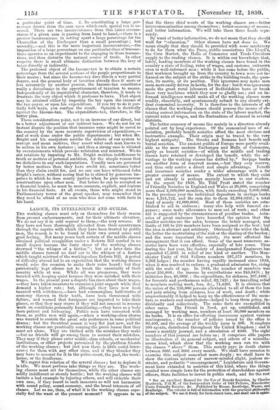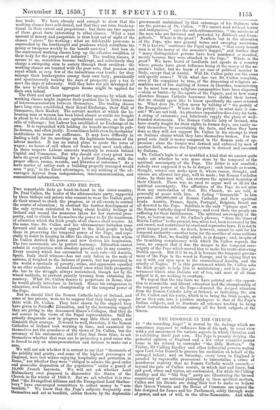LABOUR, ITS INTELLIGENCE AND GUILDS.
THE working classes must rely on themselves for their rescue from present embarrassments, and for their ultimate elevation. We do not say it in cold reproof to them,—the very reverse. If they have not been thoroughly alienated from their countrymen through the caprice with which they have been treated by public men, the reason is to be found in their own sound sense and good feeling. Not many years back certain of the middle classes obtained political recognition under a Reform Bill carried in no small degree because the lusty cheer of the working classes drowned "the whisper of a faction" ; but at a later date the middle classes turned no deaf ear to the whisper of a faction which taught mistrust of the working-class Reform Bill. A period of difficulty abroad led to an expectation that the working classes would seize the occasion to make their voice heard ; but they patriotically kept silence not to break the unanimity of their country while at war. While all was prosperous, they were taunted with keeping quiet because they were satisfied with their wages. In the present year a dispute has risen about their wages, —they have taken measures to organize a joint support while they demand a higher rate ; but, although they have now been taunted with selfishness,—have had commonplace half-truths of economy thrown in their teeth, have been threatened with failure, and warned that foreigners are imported to take their places, so that they may starve if they will not consent to resume work on conditions personally humiliating,—they have as a body been patient and forbearing. Public men have consorted with them, as public men will again,—when a working-class chorus was wanted to sustain the great solo performers in some political drama; but the theatrical season is very fiat just now, and the working classes are practically conning the grave lesson that they must act alone. They are twitted with the mistakes they make —but no friends will go among them to correct their mistakes. They may if they please enter middle-class schools, or mechanics' institutions, or other projects patronized by the platform friends of the working classes ; but just now there is little social inter- course for them with any other class, and if they blunder they may have to account for it in the police-court, the gaol, the work- house, or the deadhouse.
We regret this relation of the several classes ; but to deplore it is idle. We must perforce take things as they are. The work- ing classes must act for themselves, while the other classes are coldly indifferent or sternly hostile ; but the working classes will imitate a bad example by injuring others, and will enfeeble their own case, if they resort to such measures as will not harmonize with sound policy, sound economy, and the broad interests of all classes. Let us see, then, of what it is the working classes espe- cially feel the want at the present moment? It appears to us
that the three chief wants of the working classes are—better intercommunication among themselves ; better economy of means.; and better information. We will take these three heads sepa- rately.
By want of better information, we do not mean that they should wait for " education." Other classes have not done so. We mean simply that they should be provided with some machinery to do for them what the Press, public associations like Lloyd's, the Corn Market, the Halls of Commerce and Trade Circulars supply to the trading classes. It is within our knowledge that, lately, leading members of the working classes have found in the country a state of feeling, rates of wages, and customs, unknown even to well-informed men ; while it has come before the public, that workmen brought up from the country to town were not in- formed on the subject of the strike in the building trade, the ques- tion, its merits, or its position. This ignorance may make men seem more easily driven in herds, for the day : but it was ignorance made the great rural labourers of Bedfordshire burn or break those very machines which they now so gladly use ; and an in- formed intelligence would make all of the working classes more readily, cheerfully, and spontaneously submit to any clearly evi- dent economical necessity. It is therefore to the interests of all classes that the working classes should possess the means of ob- taining correct information on the state of the labour market, the current rates of wages, and the fluctuations of demand in several districts.
The better economy of means lies mainly in a direction already pointed out by long experience. Of the economical uses of as- sociation, probably benefit societies afford the most obvious and instructive example. Their origin may be traced to the very highest antiquity. The Greeks and Romans had benefit and burial societies. The ancient guilds of Europe were partly avail- able as the more modern Exchanges and Halls of Commerce, partly as benefit societies—of which the middle and trading classes have retained or developed the benefit, while the ad- vantage to the working classes has drifted by.* Savings banks are another form of reserved means,—but they only reserve, and thus only confer a direct and simple advantage. Benefit and insurance societies confer a wider advantage with a far greater economy of means. The extent to -which they exist and act already is perhaps scarcely known to our readers. In the report for 1858, Mr. Tidd Pratt stated the number of Friendly Societies in England and Wales at 20,000, comprising more than 2,000,000 members, with funds exceeding 9,000,0001. In the previous year the individual depositors in savings banks were 1,241,752, and the sum due to them 32,984,0231.; a total fund of nearly 42,000,000/. Most of these societies are esta- blished to aid in sickness; many also help with funeral ex- penses; some make allowances to men out of work ; and other aid is suggested by the circumstances of peculiar trades. Actu- aries of great eminence have hazarded the opinion that the smaller societies are the safer, because the better managed, and limits of 100 to 250 members have been assigned as the best ; but the idea is abstract and arbitrary. Obviously the wider the field, the better the neutralizing of the risk or the sharing of the burden ; and the more important the society, the more effectual the management that it can afford. Some of the most numerous so- cieties have been very effective, especially of late years. Thus during the last year, the Society of Amalgamated Engineers has expended 47,3681. in relief of one kind or another. The Man- chester Unity of Odd Fellows numbers 287,573 members, in 3,202 lodges ; the number having rapidly increased since 1853, when it was resolved to enforce a graduated admission fee, rising with the scale of age. In 1844, the number of members was about 256,000; the income by contributions was 245,8471. ; by initiation fees, 49,3891. ; the expenditure, for sickness, 107,4401. ; for funerals and posthumous relief, 62,742/. ; for travelling relief to members seeking work, fees, &c., 71,4201. It is obvious that the union of the 256,000 persons alleviated to all of them the loss and pain arising from sickness, loss of work, and death ; while unquestionably it helped to keep up the effectiveness of the mem- bers as workers and contributors—helped to keep them going, in- dividually and collectively. The same facts are exemplified in other cases. The Friend in Need, got up, established, and managed by working men, numbers at least 50,000 members on its books. It is an office for effecting insurances against various contingencies. ; the number of policies issued by the office is 80,400, and the average of the weekly issue is 500. It employs 300 agents, distributed throughout the United Kingdom ; and it issues a monthly journal, and a circulation of 4000. The eight numbers of this journal are before us ; it comprises able papers in illustration of its general subject, and others of a miscella- neous kind, which show that the working men can vie with the classes " above " them. This society pays in death claims between 300/. and 500/. every month. We shall have occasion to examine this subject somewhat more deeply ; we shall have to show the curious mixture of narrow-minded slight, jealous re- straint, and pedantic " encouragement," Legislature and Govern- ment have extended to societies of this kind, where the things wanted were simple laws for the protection of shareholders against officers, State facilities to invest in public stock, and for the rest • See an excellent Manual for the Use of Benefit Societies, by Charles Hardwick, P.G.M. of the Independent Order of Odd Fellows, Manchester Unity Friendly Society, &c. Published by Messrs. Houtledge, Warne, and Roudedge. The volume is full of information with the practical philosophy of the subject. We use it freely for facts stated here, and shall use it again. free trade. We have already said enough to show that the working classes have self-denial, aad that they can form funds na- tional in their extent and proportions ; but there are two aspects of these great facts interesting to other classes. What a vast amount of misery and pauperism is thus kept out of sight of the classes " above " the working ; what an intolerable poor-rate is superseded by the forethought and prudence which contribute the penny or twopence weekly to the benefit societies! And how do the contemned working classes keep up the effective condition of their body for the purposes of industry The trading classes, it occurs to us, sometimes become bankrupt, and collectively they charge a swingeing sum to society through their creditors : the working classes are taunted with the poor-rate, that pension not royal which so very few of the industrious ever touch ; for they manage their bankruptcies among their own body, providently and spontaneously, making the days of prosperity pay a tax to meet the days of adversity. Still they have not yet developed all the uses to which their aggregate means might be applied for their own behoof.
The third and not least important of the agencies by which the working classes might improve their position lies in better means of intercommunication between themselves. The trading classes have long since established their Royal Exchange, their Hall of Commerce, their Market. The servant market at which the la- bouring man or woman has been hired almost as cattle are bought is about to be abolished in our agricultural counties, as the last relic of villenage ; but Labour has established no Exchange of its own. It is reproached with holding its benefit meetings in pub- lic-houses, and often justly. It sometimes holds even its mechanics' institutions in rooms on sufferance. It may have difficulty in finding a hall for its meetings on the legitimate business of the labour market. It has no stated place to quote the rates of wages ; no house of call where all trades may meet each other. In these respects Labour consents wantonly to remain behind Capital and Commerce. But why should not every great town have its great public building for a Labour Exchange, with the proper offices, rooms, records, and libraries of reference ? As a mere matter of outlay such a building properly managed would soon " pay," in the direct advantages, to say nothing of the ad- vantages derived from independence, intercommunication, and concentrated information.



































 Previous page
Previous page